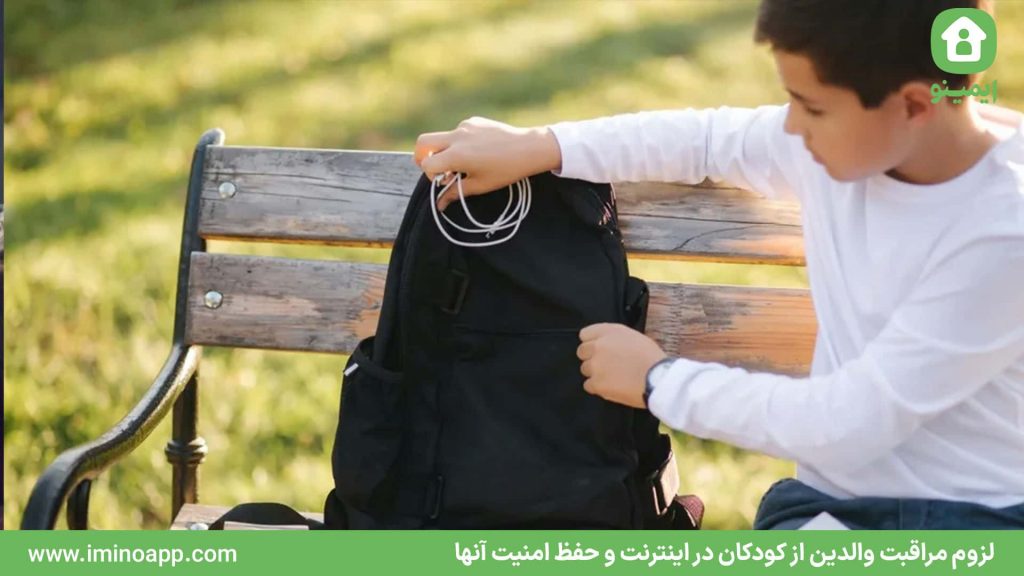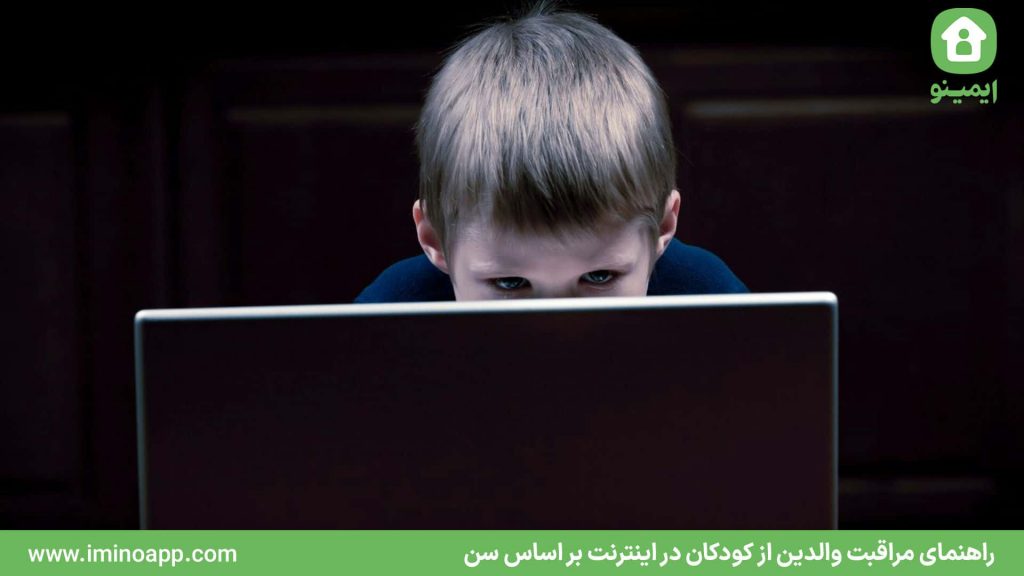Guide to Parental Supervision of Children on the Internet Based on Age and Ensuring Their Safety
In the past, due to the lack of internet and technological development, children did not have access to the internet or devices such as smartphones, tablets, internet browsing, or online gaming. However, today, parents live in a fast-paced technological world, and children have turned to the internet and the use of smart devices. For this reason, parents, teachers, and caregivers of children are examining the harms of the real world and the internet and how to supervise children without compromising their sense of security in the world. Parental supervision of children on the internet and ensuring their safety is one of these methods. But how can parents protect children in this space and ensure their safety? Stay with us to answer this question.
Learn More: What is the Best Age to Buy a Phone for My Child? Buying the First Phone for Your Child
The Necessity of Parental Supervision of Children on the Internet and Ensuring Their Safety
If you have a young child, you have probably encountered issues such as children’s addiction to games, excessive use of phones, or spending long hours on the internet. Currently, in addition to concerns related to ensuring children’s safety in the real world, the impact of interacting with strangers on the internet and media has been added, which needs to be discussed with children. Fortunately, new tools have been introduced to help ensure children’s safety in the internet space. According to experts, the level of supervision, care, and conversations with children should change with each stage of your child’s development. Sarah Worley Kimmel, an expert in digital parenting, says: We must instill and manage a healthy fear.
But what is under your supervision? When it comes to parental supervision, there are apps and tools you can use, but ultimately, you have the most control over your children’s conversations.

What Can Parents Manage?
In general, you should supervise every technology that children use and talk to them about how to use it. Elizabeth Milovidov, an author and child-rearing expert, says: Ideally, talking to children starts with teaching them how to use the device. After that, you decide whether the technology or device is suitable for your child or not.
Milovidov says: You should read books and topics related to parental supervision of children on the internet. Dedicate time to studying the terms and conditions of children’s internet use. According to her, this information is not always available online. Therefore, you should take the time to research the best books and resources in this field and become familiar with the principles of supervising children in the internet space. Ultimately, you can decide when to provide technologies such as phones and tablets to children.
Parenting coach Beatriz Moiz, who specializes in helping parents with neurodivergent children, says: Gaining knowledge about supervising children on the internet helps you better care for your child, and children will also use technology correctly and positively.
How Does Parental Supervision of Children on the Internet Ensure Their Safety?
Moiz says: Many decisions parents make are not based on experience. When children want to play Minecraft, the mother should play the game for a month herself. Then she can determine what content the game has and what needs to be done.
Moiz says: Those who create games are creative. But if you try the game, you might find something unsuitable for the child. In that case, at least the children know you tried to allow it but couldn’t for logical reasons. Moiz continues about parental supervision of children on the internet: By doing this, you have a real reason for not allowing the game (not just because you don’t like it). If you prohibit something just because you don’t like it, you risk harming your child by ignoring their perspective, and your child will also learn how to hide their actions from you.
How to Set Up Parental Supervision Features
Worley Kimmel says that in terms of parental supervision of children on the internet to ensure their safety, parental supervision settings can be applied in various layers. Parents can first activate parental supervision features within the phone or tablet, then monitor messages, and finally restrict content.
Phone Management: Look for built-in parental supervision settings on the phone, which are usually found in the settings menu. On iOS smartphones, look for the gear icon, then tap on Screen Time.
Monitoring Messages: You can outsource third-party apps and install services like Smart Family to monitor and manage an approved contact list on your child’s phone.
Restricting Content: Finally, apply content restriction options like Smart Family to internet searches and social media apps to prevent inappropriate content from being displayed.
These methods are used for supervising and caring for children in the internet space. You can apply restrictions on internet use and inappropriate content on your child’s phone or tablet. However, as your child grows older, the level of parental supervision on the internet should change to align with their developmental stage. Additionally, prepare teenagers to use the online space correctly on their own in adulthood.

Ages 3 to 5: Parental Supervision on Smart Speakers or Smartwatches
In some families, a smartwatch is the child’s first device. During the pandemic, smart speakers became the first device for children. Ages 3 to 5 are the ideal age for children to use a device with your permission and in the presence of an adult. For example, if your child wants the device, they must first ask you and play with it while you are in the room; otherwise, it is prohibited.
Parental Supervision: Moiz says that for parental supervision of children on the internet with a smart speaker, manage children by placing the device in the main living area. Smart speakers do not belong in the child’s bedroom or playroom because parents cannot supervise them there.
Milovidov says: You can make changes to smart devices. Most smart speakers have settings to restrict children’s access. If you apply these settings, your child will realize their access is limited and supervised. As a result, they will use the internet and smart devices correctly.
You can connect the smart speaker to a family account like Amazon Kids for Alexa devices or Digital Wellbeing for Google smart speakers to display a library with only age-appropriate content for children.
Most children’s smartwatches, like GizmoWatch, have built-in parental supervision features designed to ensure children’s safety. Gizmo has an app that parents install on their phones, allowing only an approved contact list to communicate with the children.
Talking to Children About Smart Speakers
At ages 3 to 5, children learn to say things that are not appropriate to say in public. For example, using inappropriate words during dinner is not suitable. The same applies to learning what is appropriate when using technology.
Always talk to your children about the harms of the online space and tell them not to share their privacy with others. Also, remind them that in the online space, all information and any type of content spreads quickly, and a small mistake can turn into a big problem, causing irreparable emotional harm.
Moiz says: Setting appropriate boundaries and parental supervision on the internet to ensure the child’s safety with a smartwatch is also important. A smartwatch is used for monitoring or tracking. She says: Playing in the presence of parents is not a problem. By supervising playtime and the amount of time children spend online, you teach them not to spend all their time on the internet. If you provide everything without any restrictions for a long time, managing children becomes difficult, and they will perceive any restrictions you impose as a form of punishment.
Ages 5 to 8: Tablets and Parental Supervision of Children on the Internet
According to the Pew Research Center, 81 percent of children in this age group receive their first tablet for watching videos and accessing the internet. At these ages, you should acquire the necessary information about parental supervision tools for children on the internet.
Parental Supervision: Tablets have a section for applying parental supervision settings on the device. You can set time limits for screen display and Wi-Fi access. For example, designate 3:00 to 3:30 PM on Tuesdays and Thursdays for your child to use the tablet. Additionally, you can find out whether your children are making in-app purchases.
Moiz says: We supervise children in the internet space using the features of phones, tablets, and other devices. Therefore, parents should familiarize themselves with these devices and their features. Spend a day learning how to use the device and its features. I love screen time settings, and I use the restrictive mode, so inappropriate content is removed, and the screen locks after the time is up.
When it comes to monitoring children’s online activities, experts recommend tools like Smart Family or Imino App.
Talking to Children About Parental Supervision of Children on the Internet for Their Safety at Ages 5 to 8
Moiz, regarding parental supervision of children on the internet for safety in the age of technology, says: My children have two hours to use their tablets. In restrictive mode, the device easily turns off after this time. If they want more time, they must ask me for permission. This method is ideal because children quickly get used to coming to you first when they want to use technology.
Milovidov says: Sit with your child and talk about parental supervision tools and apps for children on the internet. Point out the microphones on these devices and remind them that the device is listening to them.
Tell them that harm starts with online chats. They should only interact online with people they know from school. If a stranger wants to communicate with your child, they must come to you first. At these ages, you should talk about not sharing personal or identifying information online. Tell them that just as they don’t share personal information with strangers in the city, they should act the same way in this space.
Ages 9 to 11: Gaming and Parental Supervision on Smartphones
According to the same study, 67 percent of children receive their first smartphone or gaming console at this age. At this age, parents can closely monitor their child’s online activities and messages because these devices allow children to send direct messages on social media or while playing with other players in online games.
Parental Supervision: Moiz says: I sometimes randomly check my children’s phones. When your children hand over the phone, you probably check it. When starting parental supervision of children on the internet, your children may look for the phone or continue messaging, but gradually, with parental education, they adapt, and this becomes a normal practice.
With apps like Shaghayegh or Saniyar, you can restrict calls and text messages and apply content restrictions. Additionally, you can set a time for Wi-Fi to turn off at bedtime so children take a break from these devices.
According to Worley Kimmel, some parental supervision apps for children on the internet even flag harmful words or images and send parts of the conversation to you.
Worley-Kimmel laughs and says: For example, I noticed when my son searched for something sexual, but it turned out he was looking for “bouncy balls.” But I love these conversations because they make difficult talks with the child easier, and they know I’m paying attention.
Regarding gaming, check parental supervision on games like Roblox, Fortnite, and Minecraft, and ensure chats are cleared so strangers cannot contact your children.
Talking to Children About Smartphones

Kimmel says: Talk to your child about which parental controls are activated and why. Your children may become defensive and say you’re too nosy and that this violates their privacy. But remind them that when you have an online conversation, there is no privacy, even for adults. Everything I do online is exposed to the public. You can maintain all your privacy with a pen and paper.
Age 13 and Up: Parental Supervision and Monitoring on Social Media
According to a recent Morning Consult report on parental supervision on the internet for child safety, more than half of adults say they support government regulations on social media. State attorneys also want app creators like TikTok and Snap to enhance their in-app parental supervision features. Using most social media apps requires children to be at least 13 years old. Initially, parental supervision of children on the internet and content restrictions should be sufficient so that, as they grow older, your children can manage it on their own.
Parental Supervision: The first step to ensuring the safety of children in this age group is to connect their social media accounts to yours so you can easily access their interactions and messages. They will understand that nothing in the online space is private, and you are watching them. Explain the reason. Not everything in the online space is real, and you, as an adult, have more experience in these areas. That’s why you strive to supervise them and ensure their safety. Milovidov often shows her children the phishing tricks she encounters in adulthood to prove this point.
She says: When someone tries to trick me with a phone, I show my children this trick. I don’t want them to be in a position where people try to deceive them.
Additionally, you can find parental supervision settings in apps that limit your child’s interactions to only known contacts. Applying content restrictions in early adolescence and the initial stages of growth is essential.
Talking to Children About Managing Social Media and Parental Supervision of Children on the Internet
Talk about applying parental supervision of children on the internet and setting restrictions, and remind children that they can do everything under your supervision. But despite all these efforts, things may still happen. Advertisements may still disturb users and appear in private messages in apps in various ways.
Final Word
While building mutual trust and implementing parental supervision programs for children on the internet, you can tell them that when they reach 18, these supervisions will no longer exist because, ultimately, they must learn to use these technologies correctly on their own.
Worley Kimmel says: I like to stop supervising and monitoring my children when they reach 16 or 17. Because at 18, they can do whatever they want. Will parenting in the internet age become easier? Probably not. Worley Kimmel says: Our job is to help them create good habits. As a result, when our children reach 18, they will still have these habits.
#Imino #ImWithYou